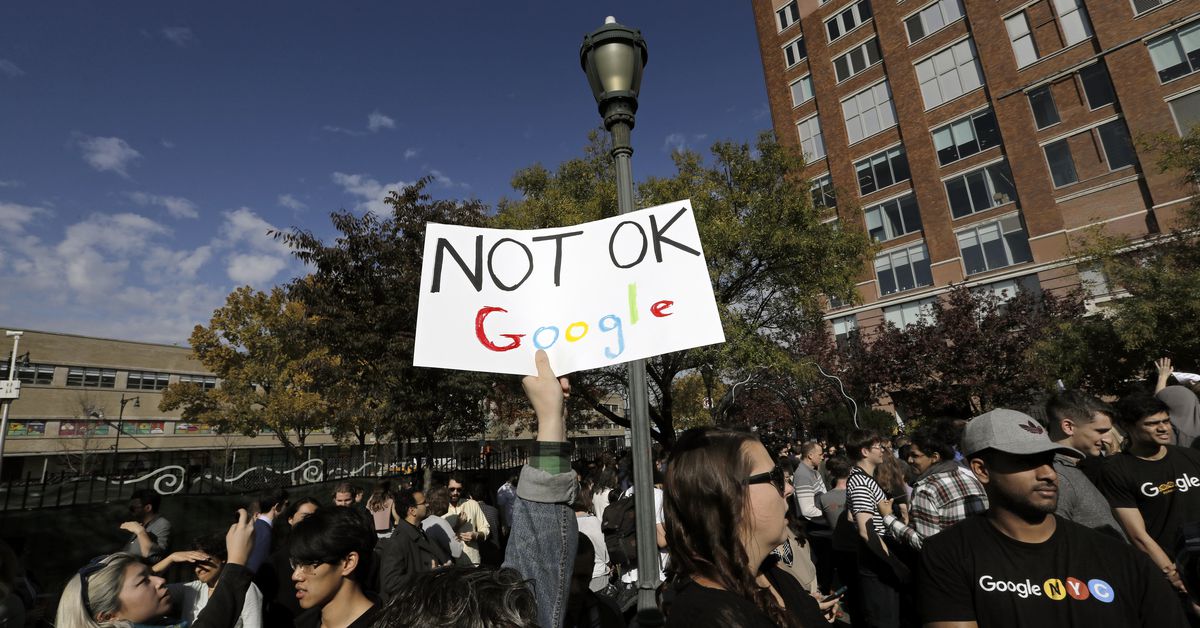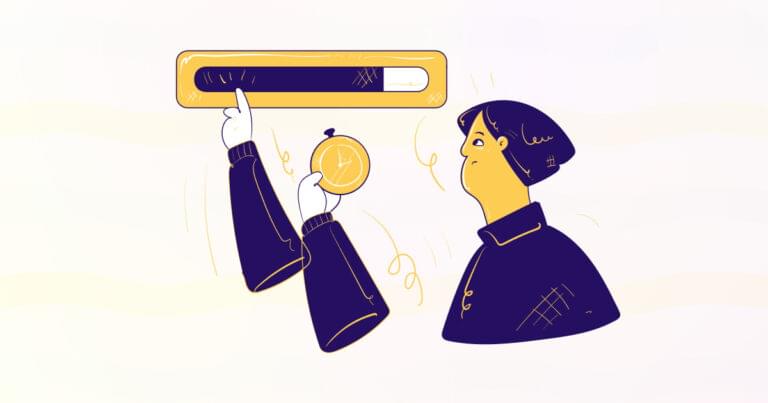
The National Labor Relations Board (NLRB), the US’s top enforcer of labor rights, just expanded its complaint against Google to include three more fired Google workers. Those former employees say the company retaliated against them for protesting its work with US Customs and Border Protection (CBP).
Now that these workers have been added to the complaint, which will be heard before an administrative judge in August, the outcome of the case could result in a shift in what employees can talk about at work without fear of repercussions from their employer.
The NLRB first filed its complaint against Google in December 2020, saying the company was “interfering with, restraining, and coercing employees” who were exercising their legal rights to discuss workplace issues with their colleagues, including firing two employees. In an amended complaint filed this Wednesday, the San Francisco regional office of the NLRB stated Google was similarly in the wrong for firing three other employees involved in workplace organizing around the same time.
Google fired the three former employees who were added to the complaint — Paul Duke, Rebecca Rivers, and Sophie Waldman — in November 2019 after they protested the company’s decision to provide cloud computing software to CBP. The former employees said they had human rights concerns about the immigration agency’s role in deporting and detaining immigrants.
Google said it fired the five workers listed in the newly joined complaint for violating its data security policies, a charge the employees deny.
“We strongly support the rights our employees have in the workplace, but we also have a strong interest in maintaining and enforcing our data security policies, which in this case were intentionally and repeatedly violated. … As the hearing on these matters moves forward, we’re very confident in our decision and legal position.” a Google spokesperson wrote in a statement.
The added cases could expand US employees’ legal rights to protest the societal impact of their company’s work, beyond the more common labor issues of wages and hours. This reflects a growing movement among rank-and-file tech workers who are pushing to have a say in how their work is used. At Facebook, for example, workers protested the company’s reluctance to take down inflammatory social media posts by Trump. And at Amazon, thousands of workers signed a petition urging the company to reduce its carbon emissions.
Meanwhile, tech companies such as Coinbase and Basecamp have tried to quell internal debate by banning political discussion at work entirely. But the Google NLRB case shows that when politics are inherently intertwined with a company’s business — something that often applies to tech companies when their services are used globally by billions of people, including national governments and world leaders — those boundaries can blur.
Generally, employees don’t have a constitutional right to free speech at work. But under US labor law, companies are not allowed to punish workers for discussing wages or working conditions in what’s called “protected concerted activity.” Typically, though, the type of activities that are protected are ones that more obviously relate to the terms of workers’ employment, like asking for better shifts or refusing to work in an unsafe environment.
In this case, the three Google workers being added to the complaint, all software engineers, were not asking for higher wages or longer lunch breaks. Instead, they were protesting work that they viewed as unethical.
In the summer of 2019, Duke, Rivers, and Waldman began researching and raising concerns internally about Google providing cloud computing software to CBP. They drafted a petition demanding that Google pledge not to work with CBP or other immigration agencies, such as US Immigration and Customs Enforcement (ICE), stating it’s “unconscionable that Google, or any other tech company, would support agencies engaged in caging and torturing vulnerable people.” Nearly 1,500 Google employees eventually signed the petition.
One of the fired workers in the complaint, Paul Duke, told Recode he started organizing with his coworkers because he didn’t want his work to “exploit, deport, or disrupt” immigrant communities, which were “under attack.” CBP, the agency Google was providing software to, was responsible for executing controversial immigration policies to detain children and separate families at the US-Mexico border.
“Engineering is about making things possible, making things easier. There is this unspoken mindset of ‘you gotta do the task,’” said Duke. “But I wanted to make sure that everybody was also in the mindset to look at their work at a higher level and say, ‘What am I being asked to do? Who is this going to benefit? What is it going to be used for?’”
Google co-founder and former CEO Sergey Brin publicly protested Trump’s immigrant travel ban at San Francisco’s airport in 2017, and Alphabet CEO Sundar Pichai has also repeatedly expressed disapproval of Trump’s restrictive immigration policies, saying he “stands with immigrants.” So some Google employees were surprised to find out about the company’s work with CBP and felt it betrayed the company’s stated values. Employees leading the petition against Google’s work with CBP also said they were organizing on behalf of the many immigrants who work at Google and were directly impacted by Trump’s immigration policies.
Under President Trump’s leadership, the NLRB’s former top lawyer initially dismissed the claims of Duke, Rivers, and Waldman because he found it outside the scope of protected worker organizing. In May, the Biden administration’s new acting general counsel, Peter Ohr, reversed that decision when he asked the regional office of the NLRB to revive the fired Google workers’ claims, as Bloomberg reported in May. Ohr’s reopening of these previously dismissed cases reflects a more worker-friendly approach in the agency under the Biden administration. As Ohr has recently stated in a public memo, he believes that, in some cases, employees’ “political and social justice advocacy” can be protected under the law — even if it’s not “explicitly connected” to workplace concerns — if that advocacy has a “direct nexus to employees’ ‘interests as employees.’”
The Google workers’ cases are “novel” according to former NLRB chair under the Obama administration, Wilma Liebman, because they could expand the interpretation of what’s considered legally protected worker organizing under what’s called “mutual aid and protection” of other employees.
“There is no question I think that this case is going to push the contours of what existing precedent would consider,” said Liebman.
But while workers are arguing that they should have a say in company matters, Liebman said, companies like Google can also argue that they have the ultimate authority over important business decisions.
“They [company leadership] will say, ‘We decide the business we do. You can protest your working conditions, but not the business of our business.’” Ultimately, Liebman said, it could take several years for the case to go through the legal process, which could entail an appeal to the federal NLRB board and further challenges in federal courts after the initial administrative hearing in August.
Google has denied that it retaliated against employees for drafting the protest letter against CBP, but instead has said that it fired employees for violating data policies, including leaking sensitive documents to the press.
“Our thorough investigation found the individuals were involved in systematic searches for other employees’ materials and work, including distributing confidential business and client information,” a Google spokesperson said in part, in a statement in response to the complaint.
The fired workers have said the information they found wasn’t confidential but publicly accessible to any of Google’s more than 100,000 employees, and that they only shared the information internally at the company. The NLRB, in its recent amended complaint, found that the documents in question regarding Google’s relationship with CBP were “public” and “employee accessible”
“I didn’t leak documents. I didn’t do anything improper,” Rebecca Rivers, one of the fired workers listed in the complaint, told Recode. “We were right in what we did. Hopefully, this case will clear my name.”
In 2019, Trump-appointed NLRB general counsel Peter Robb found that Google had illegally fired two other workers, Laurence Berland and Kathryn Spiers, who were fired around the same time as Duke, Rivers, and Waldman. The complaint alleged that Google had taken steps to “discourage employees from engaging in” protected workplace activism by illegally firing, interrogating, and surveilling the two workers. Now, the NLRB will be joining those complaints with the other three — creating a more expansive case against Google.
This isn’t the first time Google has come under fire with the NLRB for issues around workers’ rights. In September 2019, the company agreed to publicly remind its employees about their legal rights to talk about and engage in workplace organizing. It was part of a settlement with the US National Labor Relations Board over claims the company was suppressing workers’ protected speech. It was not disclosed whether the complainants received any monetary compensation.
In recent years, Google has cracked down on its once famously open work culture. This came after a wave of employee activism on issues ranging from sexual harassment to its previous work on building AI that could be used in lethal drone technology. The company issued rules discouraging workers from talking about politics on internal listservs, and created a “need-to-know” policy on sensitive documents.
Google has previously said it’s created stricter rules around workplace communications to avoid employees from being distracted and to avoid interpersonal conflict among staff. But the clampdown on internal communications at Google has made it more difficult for workers to speak out as freely as they used to about controversial company projects.
Some of the Google workers listed in the complaint said they want their case to send a message to large tech companies that there are limits to how much they can tamp down worker activism. They say they hope it inspires more people to speak up on potential wrongdoings.
“I hope going forward that there are more people in the tech industry blowing the whistle,” said Rivers.






